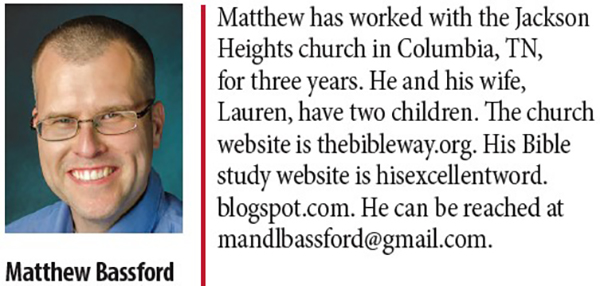
by Matthew Bassford
Synopsis: “GOD IS OPPOSED TO THE PROUD, BUT GIVES GRACE TO THE HUMBLE” (Jas. 4:6). What an amazing blessing! The Creator of the universe extends His hand of fellowship to those who are lowly, undistinguished, and unpretentious.
Will man humble himself before God? This is one of the great spiritual questions of the Bible, and indeed, one of the great spiritual questions of our time. The pages of Scripture are filled with examples of both pride and humility, with the latter preserved for everlasting glory and the former condemned to everlasting contempt. Because worship is so intertwined with human existence, these two attitudes also reveal themselves in proud and humble worship. Study of the word reveals examples of each.
Sadly, we have no trouble locating biblical stories of those whose pride corrupted even the way they approached God, and these stories display several common characteristics. The first is that proud worship chooses the wrong object. Consider God’s condemnation of the rebellious Jews of Jeremiah 13:8-10. Despite His warnings, their pride led them to worship other gods and reject Him.
Though Baal worship is rather less popular today than it was 2700 years ago, we still live in an idolatrous society, and the worship that the worldlings around us lavish on their idols reveals their pride. How many people do we know who “sing the praises” of their fat bank account, their new car, or their favorite politician?
Indeed, modern idol-worshipers proclaim their confidence in their false gods, looking to them for blessing and deliverance instead of to the Lord of hosts. Even if they may show up for services some place on Sunday morning, their words make clear where their true hope lies. Finally, of course, their speech reveals their confidence in themselves, in accumulating so much money, or in championing the right candidate. As it always is with idolatry, the true idol of today is self.
Second, proud worship reveals itself in its refusal to obey the divine ordinance. This is clear in the tragic case of Uzziah, king of Judah, as recorded in 2 Chronicles 26:16-22. To this point, Uzziah had been a righteous king, but his pride provoked him to offer incense in the temple, even though he was not of Aaron’s lineage. Despite opposition from the priests, he persisted in his unlawful worship. Within the sanctuary itself, God struck him with leprosy.
Based on the arguments they make now, we can only conclude that there are many who would have defended Uzziah’s unconscionable actions all those centuries ago: “It’s not fair to reserve offering incense to only a few!” “Isn’t Uzziah just as good as the priests are?” “The law never specifically says that kings can’t offer incense!” And so forth. However, the desire to alter God’s revealed plan of worship never comes from humility—only from pride.
Finally, pride in worship leads to a refusal to acknowledge sin before God. God Himself describes this problem in His people in Zephaniah 3:11. They exult on the holy mountain of the temple, but their volume conceals their proud rebellion against God. Although they won’t deal with their sin, God will. Soon, they will be removed forever.
As all of us know too well, hypocrisy remains a problem among the Lord’s people. There are plenty of Christians who will never respond to the invitation but ought to be responding on a weekly basis! Regardless of how faithfully they attend or how loudly they sing, their sins have made a separation between them and God. For as long as their shamelessness and their pride continue, that state of alienation persists as well. If they die without having confessed their sin, they will be separated from Him eternally.
Manifesting humility in worship, of course, is the opposite of these things. Rather than straying after idols, humility seeks the Lord. We see both halves of this illustrated in the life of the long-lived king Manasseh. Manasseh was among the most wicked of all the kings of Judah, debasing himself with every kind of idolatry, going so far as to offer his own sons as sacrifices to Molech.
The vengeance of God was swift. An Assyrian army descended upon Judah and bore Manasseh off to Babylon. While there, however, Manasseh humbled himself before God. The Lord heard his prayer and restored him to kingship in Judah.
Manasseh’s story should be deeply encouraging to us. It reminds us that, no matter how badly we have sinned against God with our own favorite idols, His compassion is so great that it is always possible for us to repent and return. When we seek Him with a whole heart, we will find Him! The songs and prayers that we offer to Him with humility will always be heard.
It also is true that humble worship is obedient worship. The desire of the humble to join in true worship appears in 2 Chronicles 30:6-11. After the Assyrians had carried the majority of Israel into captivity, Hezekiah sent a letter to the remainder, inviting them to come and celebrate the Passover in Jerusalem. Most rejected his offer, but a few humbled themselves and came, thus becoming the first people in hundreds of years to celebrate the Passover according to the law.
So too for us. The expressions of worship that the law of Christ requires of us are simple. Read the Scriptures together. Sing. Pray. Celebrate the Lord’s Supper. Give of our means. It ordains also that our assemblies are to be led by men.
If we are humble, we will obey. We will do these things and only these things. We will not listen to the voices of the world around us. We will not be swayed by our culture. We will not imagine that we know better than God does. We will do what He has asked because He has asked us to do it.
Finally, humble worship is repentant worship. The beautiful language of Isaiah 66:1-2. God is unimpressed with our pride. He is not concerned with the majesty of the works that we might do in His name. He cares only that we are humble and contrite, and that we tremble at His word.
Our humility and contrition should appear in what we say. The prayers we offer in our assemblies should be prayers of repentance. In our singing, we should acknowledge our sin and confess our dependence on His grace.
More than that, though, our humility and our sorrow for sin should be evident in our hearts. The one who wishes to come into the presence of the Lord must do so with clean hands and a pure heart, and if ours are not, we must cleanse and purify them.
If this is truly our desire, we will no longer be like the sow that, once washed, quickly returns to the mire. Grace is a gift, not a permission slip. It places us under obligation to be holy. If we want to be holy worshipers, we must humbly seek holiness every day of our lives.
Pride is deadly to godly worship, but humility is the fertile soil from which it springs. How could it be otherwise? The very act of worship is an acknowledgment that another is greater than we are, and if we say such things while cherishing a sense of our own greatness, our hearts give the lie to what we claim.
Instead, let us seek the mind that first was in Christ Jesus. Though He had far greater reason than we do to insist on His prerogatives, He surrendered them all far more graciously and completely. In the praise that we offer God, may each of us be guided by His example, so that, as we have humbled ourselves, we may be exalted by Him! 


